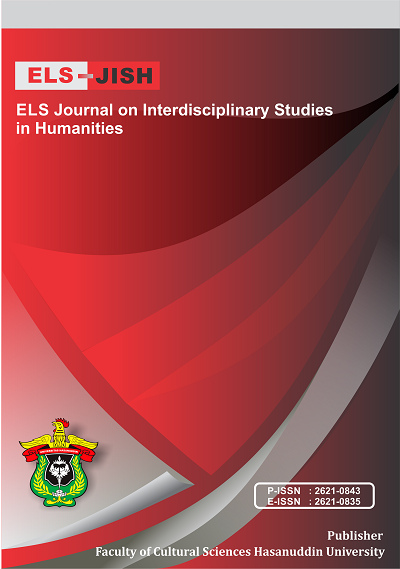Languange Learning Adapatation Model In The Era of Society 5.0
DOI:
https://doi.org/10.34050/elsjish.v5i4.21499Keywords:
Society 5.0, Learning Adaptation, Indonesian LanguageAbstract
This article aims to explain the adaptation model of language learning in the 5.0 society era. The method used is descriptive qualitative. The data used a library study on various studies of Language learning in the 5.0 era of society. The data were then identified and analyzed to build an understanding of the adaptation model of language learning in the 5.0 era as a form of response to future learning. The results of this study indicate that the adaptation model of Language learning to the era of society 5.0 is closely related to mastery of the field of Language which is integrated with mastery of the latest Information Technology, and mastery of 21st-century skills, namely creative thinking, critical thinking and problem solving, communication, and collaboration. However, the adaptation process and its results are largely determined by the ability of lecturers, students, and supporting facilities and infrastructure so that they can run well.
References
Ahimsa-Putra, H.S. (2007). Paradigma, Epistemologi, dan Metode Ilmua Sosial Budaya-Sebuah Pemetaan. Makalah disampaikan dalam pelatihan Metodologi Penelitian yang diselenggrakan CRCS-UGM, Yogyakarta.
Annisa, A. (2021). Sejarah Revolusi Industri dari 1.0 sampai 4.0. Artikel Mahasiswa Sistem Telekomunikasi, 1(January).
Barowi & Aba (2015). Pentingnya Pembelajaran Bahasa Indonesia Di Perguruan Tinggi. Jurnal Intelegensia, 03 (01). https://ejournal.unisnu.ac.id/JI/article/view/1338/1346.
Campbell, D. (1998). Mengembangkan Kreativitas, terjemaahan. Manhunghardjana. Yogyakarta: Kanisius.
Costa, J.M. (2018). Dinheiro Vivo. Available: https://www.dinheirovivo.pt/opiniao/sociedade-5-0-o-futuro-pelo-pre sente
Era, E. (2020). Disrupsi Pembelajaran Bahasa Dan Sastraindonesia Pada Era Digital. Prosiding Seminar Nasional Pendidikan Program Pascasarjana Universitas PGRI Palembang.
Gunawijaya, I. W.Titra. (2021). E-Learning Menjadi Platform Pembelajaran Era Society 5.0. PRAMANA Jurnal Hasil Penelitian, 1 (1).
Hasniyati, Syari (2018). Menghadapi Revolusi Industri 4.0 dengan Rumah Belajar. http://pena.belajar.kemdikbud.go.id/2018/09/menghadapi-revolusi-industri-4-0-dengan-rumah-belajar/.
Leu, Don., Coiro, Julie., Kinzer, Charles., & Castek, Jill. (2017). ―New Literacies: A Dual Level Theory of the Changing Nature of Literacy, Instruction, and Assessment. Journal of Education, 197(2), 1150–1181. Retrieved from https: //journals.sagepub.com/doi/abs/1 0.1177/002205741719700202.
Hidayati, E.S., P. Andani. (2020).Pembelajaran Bahasa Indonesia Menuju Masyarakat 5.0.
Ibda, Hamidulloh (2019). Pembelajaran Bahasa Indonesia Berwawasan Literasi Baru Di Perguruan Tinggi Dalam Menjawab Tantangan Era Revolusi Industri 4.
i-SCOOP (n/d). From Industry 4.0 to Society 5.0: The big societal transformation plan of Japan. Retrieved December 13, 2019 from https://www.i-scoop.eu/industry-4-0- society-5-0/.
Jumari, Sena Suharya. (2020). Pembelajaran Bahasa Indonesia Menuju Masyarakat 5.0. Prosiding Seminar Nasional Pendidikan Program Pascasarjana Universitas Pgri Palembang 10 Januari.
Junaidi, J., Budianto Hamuddin, B., Wendy, S., Fathu, R., & Tatum, D. (2020). ICT usage in teaching English in Pekanbaru: Exploring junior high school teachers’ problems. International Journal of Advanced Science and Technology, 29(03), 5052-5063.
Keidanren (Japan Business Federation) (2016). Toward realization of the new economy and society. Reform of the economy and society by the deepening of “Society 5.0”. Retrieved April 16 2018 from http://www.keidanren.or.jp/en/policy/2016/029_outline.pdf
Kuntarto, E. (2017). Keekfetivan Model Pembelajaran Daring dalam Perkuliahan Bahasa Indonesia di Perguruan Tinggi. Language Education and Literature, [S.l.], v. 3, n. 1, p. 99-110, https://www.syekhnurjati.ac.id/jurnal/index.php/jeill/article/view/1820.
Lung, Nicky. (2018). Singapore Minister of Education on the Importance of Higher Education Reform for Industry 4.0”. https://www.opengovasia.com/singaporeminister-of-education.
Mansyur, F.A. (2018). Onina Manga Mancuana Mangenge: Ungkapan Tradisional Orang Wolio, Doctoral Dissertaiton. Universitas Gajah Mada. Retrieved from: http://digilib.fib.ugm.ac.id/digital/filter/960.
Mansyur, F. A., Nuryadin, C., & Muchtar, M., Sahril, S., Amayliya, W. O. A. (2021). Character Education Values in Indonesian Proverbs. ELS Journal on Interdisciplinary Studies in Humanities, 4(3), 346–354. https://doi.org/10.34050/elsjish.v4i3.18017.
Mansyur, Firman Alamsyah, & Suherman, L. A. (2020). The Function of Proverbs as Educational Media: Anthropological Linguistics on Wolio Proverbs. ELS Journal on Interdisciplinary Studies in Humanities, 3(2), 271–286. https://doi.org/10.34050/els-jish.v3i2.10505.
Mansyur, Firman Alamsyah, & F.I. Taharu (2021). Problematika dan Strategi Pembelajaran pada Masa Pandemi di Wilayah Pesisir Kepulauan Buton. Sang Pengcerah, Jurnal Ilmiah Universitas Muhammadiyah Buton, 7 (4), DOI: https://doi.org/10.35326/pencerah.v7i4.1468.
Nugroho, W. A. (2007). Available FTP: http://www.ilmukomputer.com. Tanggal akses: 16 Januari 2009
Nusantara, T. (2020). Society 5.0 dan Riset Perguruan Tinggi Indonesia. Prosiding Seminar Nasional Berseri, 1(1), 1-20. https://doi.org/10.22236/semnas/111-20166.
Rahman, F. (2019). Trends in Reading Literary Fiction in print and cyber media by undergraduate students of Hasanuddin University. International Journal of Education and Practice, 7(2), 66-77.
Ristekdikti. (2018). Pengembangan Iptek dan Pendidikan Tinggi di Era Revolusi Industri 4.0.‖ Ristekdikti.Go.Ig.
Rohmadi, M. (2018). Strategi dan Inovasi dalam Pembelajaran Bahasa dan Sastra Indonesia di Era Industri 4.0 . Proceeding Pertemuan Ilmiah Bahasa dan sastra Indonesia. (PIBSI).
Serpanos, Dimitrios (2018). The Cyber-Physical Systems Revolution. Computer, 51I(3), March 2018, pp. 70-73
Sharma, P. (2019). Digital Revolution of Education 4.0. International Journal of Engineering and Advanced Technology (IJEAT), 9 (2), https://www.ijeat.org/wp-content/uploads/papers/v9i2/A1293109119.pdf.
Sajidan, S., Saputro, Ryzal Perdana., Atmojo, Idam Ragil Widianto., & Dewanta Arya Nugraha. (2020). Development of Science Learning Model towards Society 5.0: A Conceptual Model. International Conference on Science Education and Technology, doi:10.1088/1742-6596/1511/1/012124.
Sugiyono. (2015). Metode Penelitian Pendidikan: Penelitian Kuantitatif, Kualitatif, dan R & D. Alfabeta.
Suwandi, Sarwiji (2018) Tantangan mewujudkan pembelajaran bahasa dan sastra Indonesia yang efektif di era revolusi industri 4.0. Working Paper. Badan Pengembangan dan Pembinaan Bahasa, Jakarta. http://repositori.kemdikbud.go.id/id/eprint/9961
Tarigan, H. G. (1981). Berbicara sebagai Suatu Keterampilan Berbahasa. 1st ed. Bandung: Angkasa.
Yamnoon, S. (2018). Education 4.0, Teaching and Learning in 21 th Century. Lobbury Thailand: Thepsatri Rhajabat
Wihadanto, Ake. (2017). Entepreneurleadership di Era Revolusi Industri 4.0.‖ In Upacara Wisuda Universitas Terbuka Periode I Tahun Akademik 2017/2018. Jakarta: Universitas Terbuk
Downloads
Published
How to Cite
Issue
Section
License
Copyright (c) 2022 Firman Alamsyah Mansyur, Arsad Arsad, La Ode Achmad Suherman, Isti’anatul Himah, Istifatun Zaka, Zilani Zilani, Ilham Syarifuddin

This work is licensed under a Creative Commons Attribution-NonCommercial-ShareAlike 4.0 International License.






